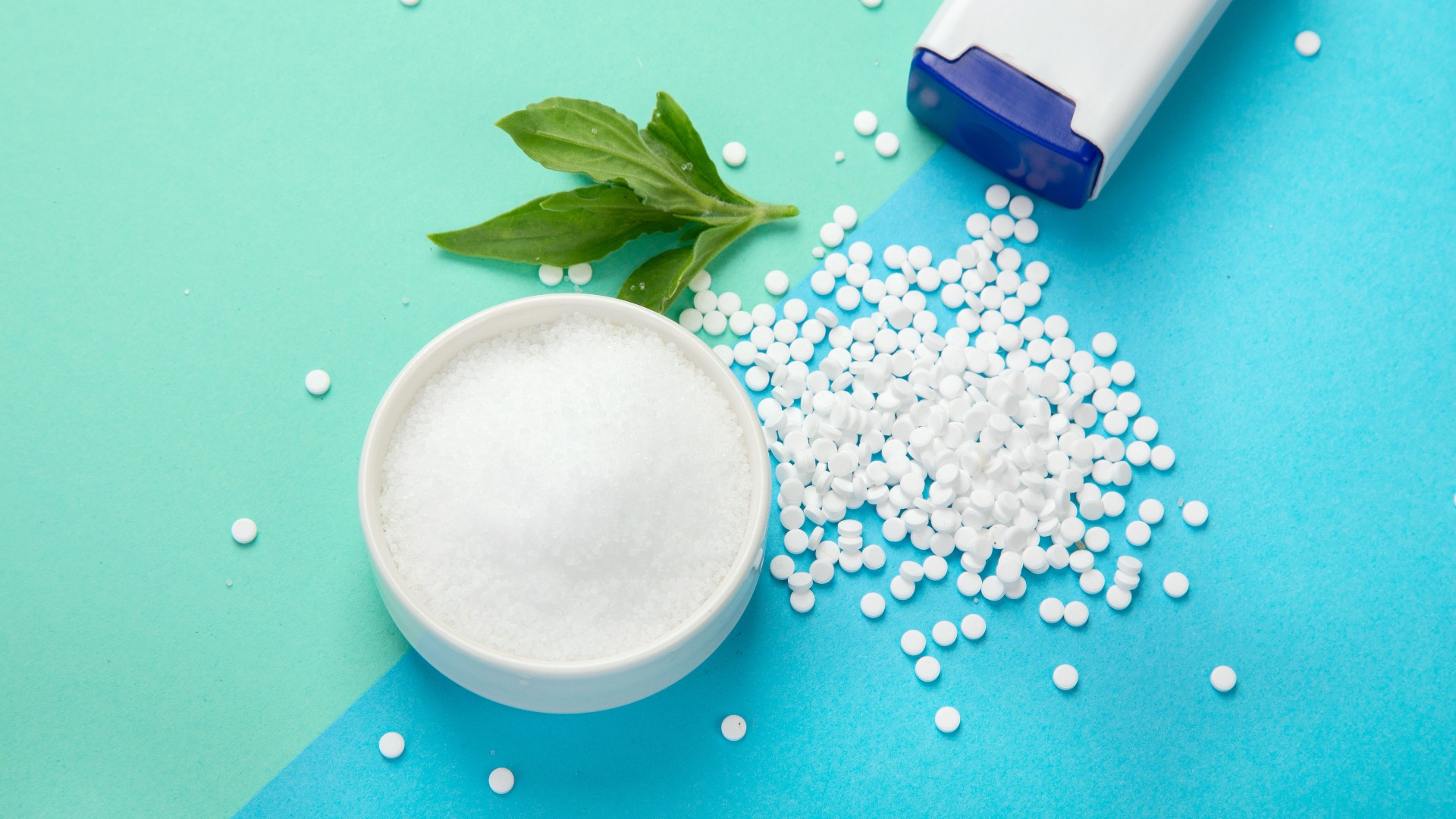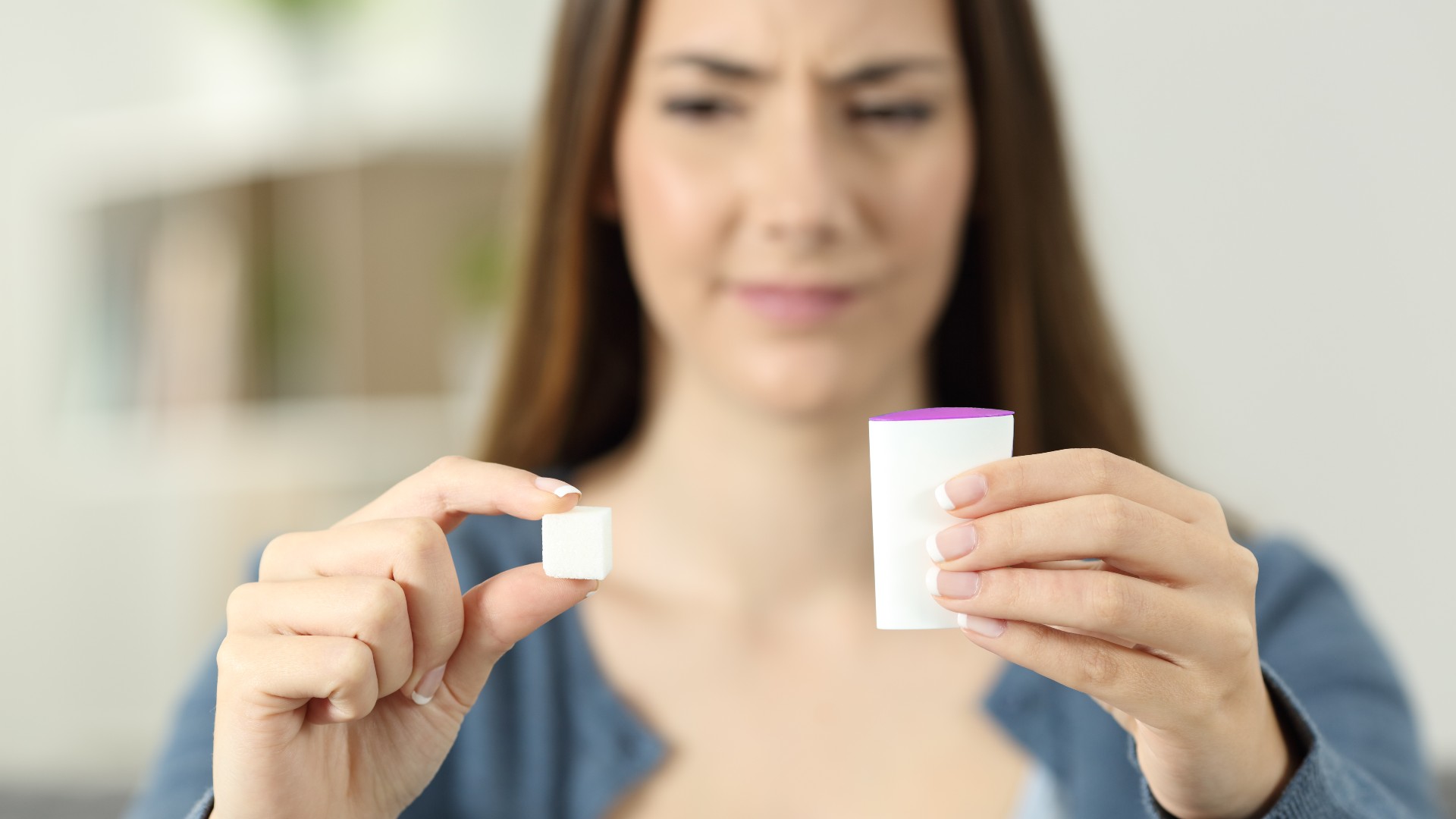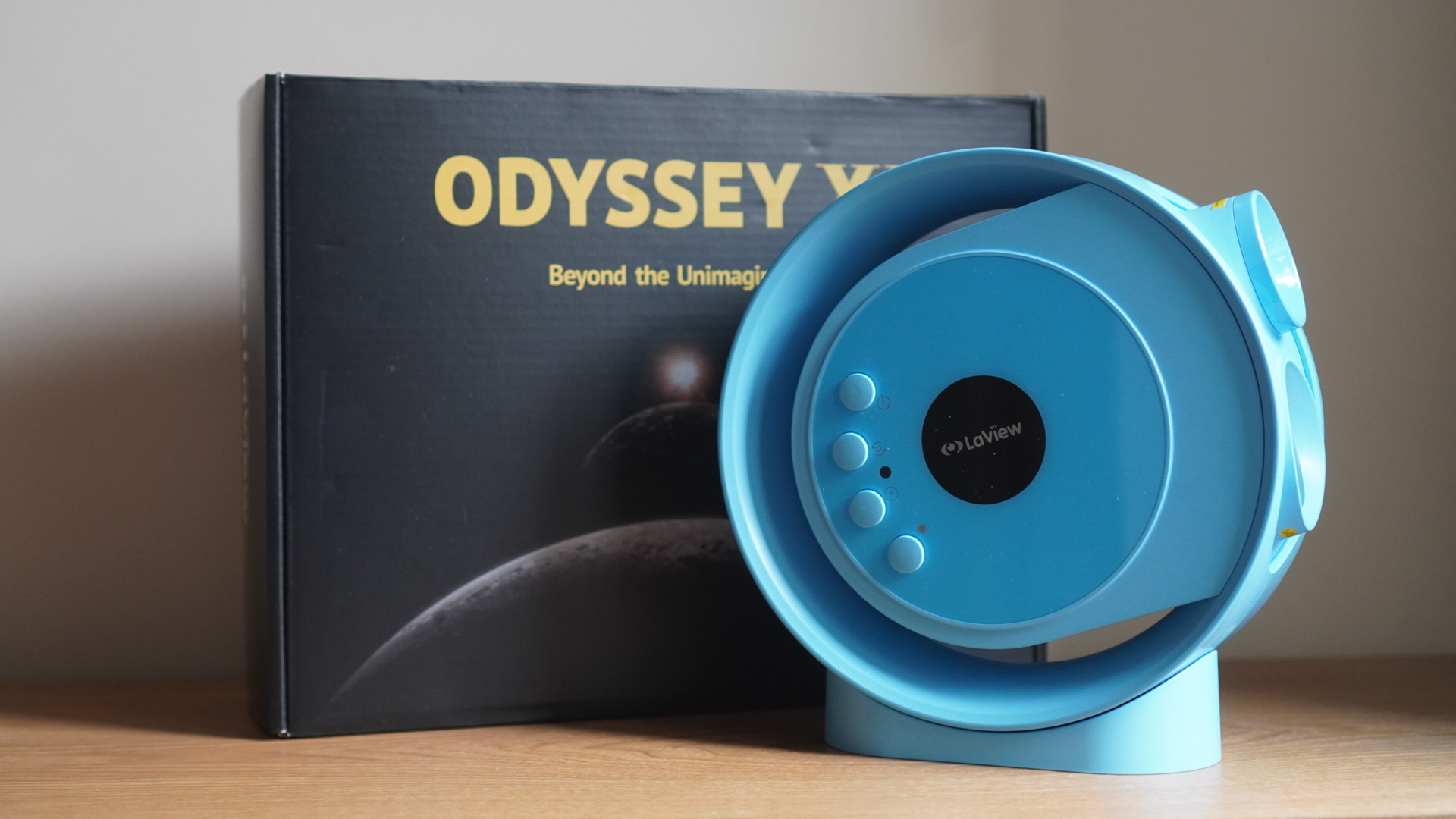Are artificial sweeteners bad for you?
Are artificial sweeteners bad for you? We weigh up the evidence on sugar substitutes

Sugar substitutes have become commonplace in many low-calorie foods and diet beverages, but are artificial sweeteners bad for you? Currently, the use of them is tightly regulated by government authorities and only the ones that have been shown to be safe for consumption are allowed to be sold. At the same time, growing evidence suggests artificial sweeteners may have implications for many aspects of our health.
Artificial sweeteners should not be confused with nutritive sweeteners, such as sorbitol and xylitol, which can be found in the plant-based world. Synthetic sugar substitutes, such as acesulfame-K, aspartame and sucralose, are manmade and, as a result, are not absorbed and metabolized in the same ways as many other nutrients.
Here, we discuss what the science says about artificial sweeteners and their effects on human health.
What are artificial sweeteners?
Artificial sweeteners are sweeteners that contain few to no calories, yet have a higher intensity of sweetness per gram than sweeteners with calories (such as table sugar, honey or corn syrups). They may also be referred to as low-calorie sweeteners (LCS), non-nutritive sweeteners (NNS), sugar substitutes, and high-intensity sweeteners.
Artificial sweeteners are a common ingredient in many foods and beverages, including dairy products, frozen desserts, baked goods, candies, chewing gum, breakfast cereals and canned foods. Many products labeled as sugar-free or diet will contain one or more sugar substitutes. Some artificial sweeteners are also sold on their own, as general purpose sweeteners.
There are currently six artificial sweeteners approved as food additives by the US Food and Drug Administration (FDA):
- Acesulfame-K – such as Sunett and Sweet One; 200 times sweeter than sugar
- Aspartame – such as Equal, NutraSweet and Sugar Twin; 200 times sweeter than sugar
- Neotame – such as Newtame; 7,000-13,000 times sweeter than sugar
- Saccharin – such as Sweet’N Low, Sweet Twin and Necta Sweet; 200-700 times sweeter than sugar
- Sucralose – such as Splenda; 600 times sweeter than sugar
- Advantame – no brand names; 20,000 times sweeter than sugar

How do artificial sweeteners work?
The role of artificial sweeteners is to trick our brain into believing that we’re eating sugar. Human beings are conditioned to seek and enjoy sweet foods, as they provide a high amount of calories. For thousands of years, energy-dense foods were essential for the survival of our species. To identify them, humans have developed tastebud receptors that detect sweetness. Artificial sweeteners bind to these receptors, creating a sensation similar to when we eat sugar.
Get the world’s most fascinating discoveries delivered straight to your inbox.
But our bodies are not able to digest sugar substitutes. When ingested, these compounds tend to pass through our gastrointestinal system without being absorbed. However, because they are not similar molecules, they are metabolized differently from each other. As scientists from Frontiers in Nutrition point out, these properties may explain why there is so much conflicting evidence about their health effects. Many studies look at artificial sweeteners as a whole, rather than test them individually.
There is also ongoing debate as to how sugar substitutes affect our brains. Scientists are particularly concerned that artificial sweeteners can interfere with parts of the brain related to energy metabolism and taste perception, potentially fuelling sugar cravings and problems with appetite regulation. According to a review published in Nutrients, the evidence from fMRI studies is mixed, and more research is needed to fully understand this issue.
What are the effects of artificial sweeteners?
According to Dr. Simon Steenson, a nutrition scientist at the British Nutrition Foundation, it’s difficult to know exactly what effects artificial sweeteners have on our health. “Many of the studies that have looked at whether artificial sweeteners have a harmful effect on our health have been observational studies, which cannot tell us whether there is a cause and effect relationship,” he says.
“There have been conflicting results and controversy of the science around the effects of low- and no-calorie sweeteners on our health, including weight management and blood sugar control. What is well known is that excess added sugar is not good for our health, which has led to low- and no-calorie sweeteners being used to replace some, or all, the sugar in foods and beverages.”

Steenson graduated from the University of Nottingham, U.K., with a degree in Nutritional Biochemistry, after which he spent 18 months working as a researcher within the Medical Research Council’s Human Nutrition Research unit in Cambridge. He returned to academia to study for a PhD in Nutritional Sciences at the University of Surrey, which he completed in September 2018. Steenson's doctoral research focused on the impact of fructose sugar on cardiovascular disease risk, with a specific focus on its effects on fat metabolism in the small intestine.
Dr. Mitchell S V Elkind, Professor of Neurology and Epidemiology at Columbia University Irving Medical Center, agrees. “In general, we think that artificially sweetened beverages may be of benefit as an alternative to sugar-sweetened beverages for people who are obese because they may help to reduce weight,” he says. “But there is growing evidence that artificially sweetened beverages, and thus likely artificial sweeteners themselves, can increase the risk of stroke, cardiovascular disease and even death.

Elkind is a tenured Professor of Neurology and Epidemiology at Columbia University Irving Medical Center, and Chief of the Division of Neurology Clinical Outcomes Research and Population Sciences (Neuro CORPS) in the Neurology Department. He received his medical degree from Harvard Medical School, and he trained in Internal Medicine at Brigham and Women’s Hospital and in Neurology at Massachusetts General Hospital, both in Boston, MA.
“The studies are tricky to interpret because although there are associations, it is hard to determine whether there is a causal effect. It could be that people who are already at risk of stroke and heart disease because of obesity, diabetes and other risk factors are just more likely to consume artificial sweeteners, thinking that these sweeteners will help them, rather than the sweeteners being the cause of their stroke or heart attack.
“On the other hand, there is evidence that artificial sweeteners may have negative effects on metabolism, increase the desire to consume other high-calorie foods, paradoxically increase weight, and even increase risk for diabetes. So the jury is still out.”
Elkind also stresses that there could be another reason why it is difficult to determine the effects of artificial sweeteners on our bodies. “It is a complicated question because there are many different artificial sweeteners and what may be true for some may not hold for others,” he points out.
So what do we know so far?

Weight management
Sugar substitutes may be a great tool for cutting down on sugar consumption. However, there is growing evidence that they may not be as effective for long-term weight management as previously thought.
According to a review published in the Nutrients journal, most research demonstrates that using artificial sweeteners does not tend to increase our preference for sweet food or make us eat more. At the same time, a meta-analysis published in the Canadian Medical Association Journal reports that routine intake of sugar substitutes does not help us lose weight, and may even lead to weight gain and cardiometabolic problems.
As researchers from the Endocrine Practice journal point out, many of these studies were poorly designed so it is hard to draw conclusions. On the plus side, artificial sweeteners can be of benefit to those who struggle with excessive sugar consumption.
Gut health
Scientists are increasingly concerned about the effects of artificial sweeteners on our gut health. As described in the Nutrients journal, certain sugar substitutes may affect the diversity and composition of the ‘good’ gut bacteria in some individuals. According to another article in the Nutrients journal, aspartame and acesulfame-K do not interact much with gut microbiota, but saccharin and sucralose may have an effect.
What’s more, a study published in the International Journal of Molecular Sciences indicates that sugar substitutes may disrupt the microbes’ ‘communication system’, called quorum sensing (QS). QS is critical to regulating bacteria group behaviors that have a positive effect on our overall health. Aspartame, sucralose, and saccharin are all artificial sweeteners that may disrupt that important communication channel. Another study suggests that artificial sweeteners can damage the lining of our intestines by over-activating the T1R3 sweet taste receptor. T1R3 receptors are involved in healthy metabolism, and sugar substitutes like aspartame, saccharin, sucralose and aspartame can disrupt its functioning.

Cardiovascular health
The evidence is growing that artificial sweeteners may be bad for our cardiovascular health. According to a meta-analysis published in the Canadian Medical Association Journal, they may increase our risk of heart disease and associated conditions. A recent study points to aspartame, acesulfame-K and sucralose as potentially the most harmful sugar substitutes.
Brain health
Artificial sweeteners may also have a negative effect on our brain health, although this research is still in its infancy. A 2018 study published in the Journal of Biochemical and Molecular Toxicology found that sugar substitutes may harm cognition and parts of the brain responsible for learning and memory. But because it was conducted on rats, it is difficult to say whether it can be translated to humans.
Dental health
According to the Journal of Dental Education, sugar substitutes can decrease the rate of dental caries in children by up to 60%. However, most reviewed studies focus on the effect of sorbitol and xylitol, which do not fall into the category of artificial sweeteners. However, studies show that sucralose could also be beneficial for dental health.

Are artificial sweeteners safe?
According to the FDA, all of the approved artificial sweeteners are safe for consumption when ingested within limits. When it comes to aspartame, the FDA reviewed more than 100 studies and concluded that it poses no risk to most people. However, people with a rare disorder called phenylketonuria should avoid it. Aspartame contains phenylalanine, which individuals with phenylketonuria are unable to properly metabolize.
Similarly, the FDA has evaluated more than 110 studies on sucralose and 90 studies on acesulfame-K, and consider them as safe for consumption. Saccharin used to be perceived as a factor in bladder cancer. However, it was removed from the potential carcinogens list in 2000, when more high-quality studies came to light. Now the FDA concluded that it poses no risk.
Are artificial sweeteners bad for you?
When ingested in reasonable amounts, artificial sweeteners do not pose a risk to our health. Nonetheless, we still do not understand the full scope of their effects on our bodies. A growing body of evidence suggests that certain individuals may be more at risk of gastrointestinal and cardiometabolic problems, but this is still in its infancy.
This article is for informational purposes only and is not meant to offer medical advice.

Anna Gora is a health writer at Live Science, having previously worked across Coach, Fit&Well, T3, TechRadar and Tom's Guide. She is a certified personal trainer, nutritionist and health coach with nearly 10 years of professional experience. Anna holds a Bachelor's degree in Nutrition from the Warsaw University of Life Sciences, a Master’s degree in Nutrition, Physical Activity & Public Health from the University of Bristol, as well as various health coaching certificates. She is passionate about empowering people to live a healthy lifestyle and promoting the benefits of a plant-based diet.
 Live Science Plus
Live Science Plus





